Research Methodology Analysis: Big Data's Role in Business
VerifiedAdded on 2022/08/29
|10
|2675
|21
Report
AI Summary
This report provides an analysis of research methodologies applicable to the study of big data analytics in business. It examines three primary methodologies: qualitative, quantitative, and quasi-experimental. The report begins by outlining the importance of well-defined research questions and justifies the chosen questions related to the role of data analytics, the difference between big data and data analytics, and the skills of analysts. It then delves into each methodology, detailing data collection methods, sample descriptions, advantages, limitations, and ethical considerations. Qualitative methodology, involving interviews and literature reviews, is contrasted with quantitative approaches using surveys and statistical analysis. Quasi-experimental methodology, manipulating independent variables, is also examined. The report highlights the strengths and weaknesses of each approach, providing a comprehensive overview of their applicability and ethical implications in the context of big data analytics research. The student's work is available on Desklib, a platform offering study resources.
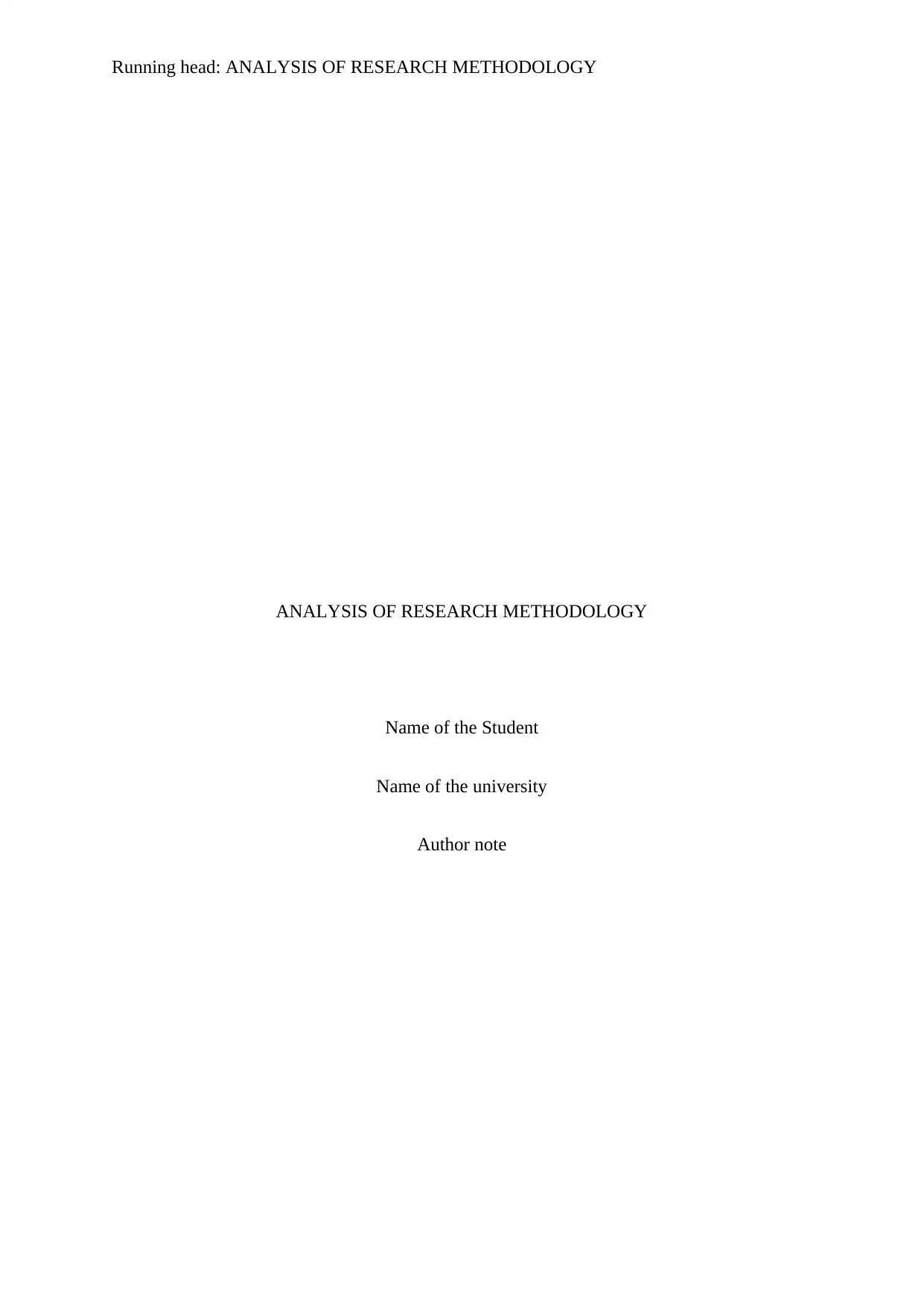
Running head: ANALYSIS OF RESEARCH METHODOLOGY
ANALYSIS OF RESEARCH METHODOLOGY
Name of the Student
Name of the university
Author note
ANALYSIS OF RESEARCH METHODOLOGY
Name of the Student
Name of the university
Author note
Paraphrase This Document
Need a fresh take? Get an instant paraphrase of this document with our AI Paraphraser
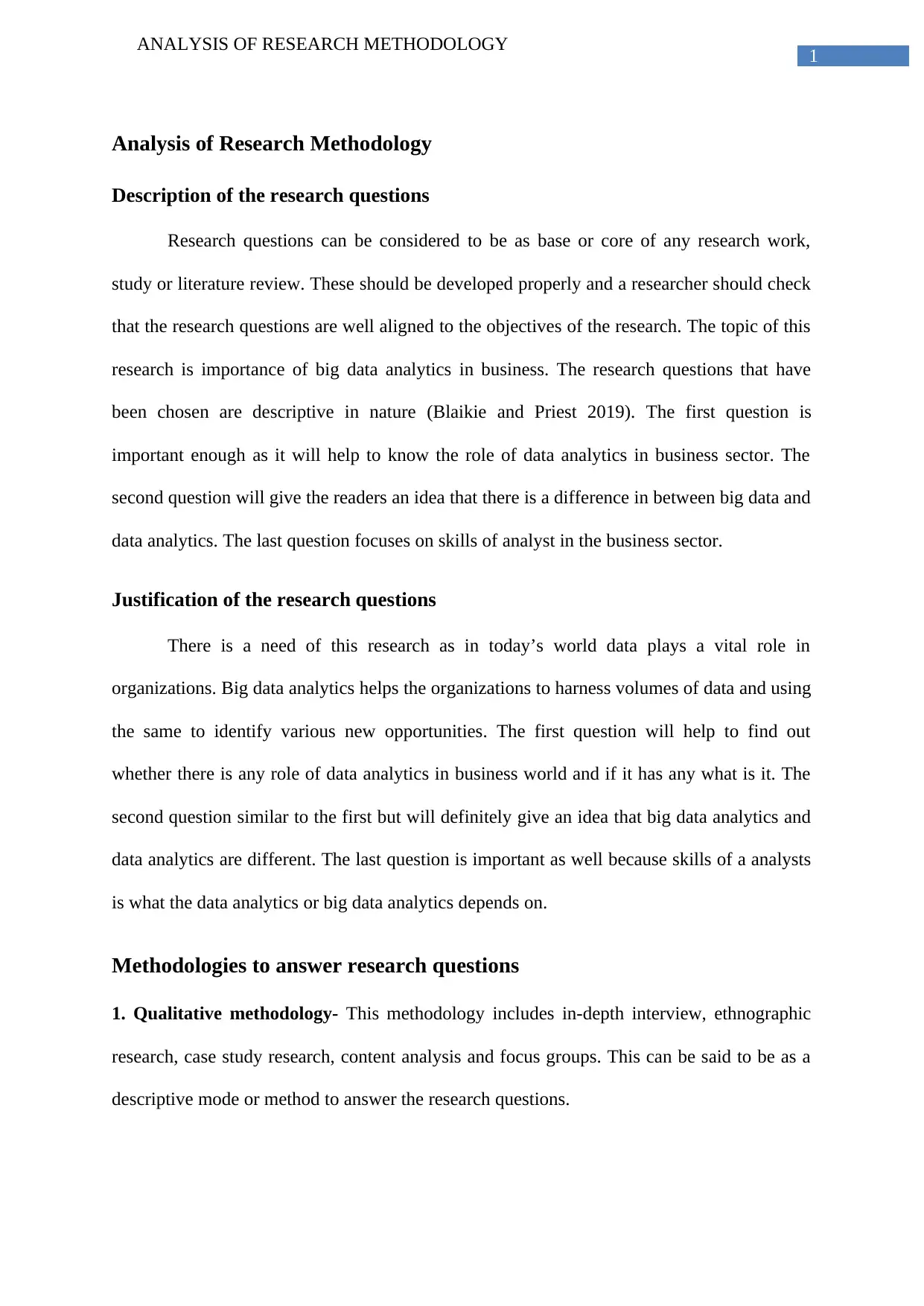
1
ANALYSIS OF RESEARCH METHODOLOGY
Analysis of Research Methodology
Description of the research questions
Research questions can be considered to be as base or core of any research work,
study or literature review. These should be developed properly and a researcher should check
that the research questions are well aligned to the objectives of the research. The topic of this
research is importance of big data analytics in business. The research questions that have
been chosen are descriptive in nature (Blaikie and Priest 2019). The first question is
important enough as it will help to know the role of data analytics in business sector. The
second question will give the readers an idea that there is a difference in between big data and
data analytics. The last question focuses on skills of analyst in the business sector.
Justification of the research questions
There is a need of this research as in today’s world data plays a vital role in
organizations. Big data analytics helps the organizations to harness volumes of data and using
the same to identify various new opportunities. The first question will help to find out
whether there is any role of data analytics in business world and if it has any what is it. The
second question similar to the first but will definitely give an idea that big data analytics and
data analytics are different. The last question is important as well because skills of a analysts
is what the data analytics or big data analytics depends on.
Methodologies to answer research questions
1. Qualitative methodology- This methodology includes in-depth interview, ethnographic
research, case study research, content analysis and focus groups. This can be said to be as a
descriptive mode or method to answer the research questions.
ANALYSIS OF RESEARCH METHODOLOGY
Analysis of Research Methodology
Description of the research questions
Research questions can be considered to be as base or core of any research work,
study or literature review. These should be developed properly and a researcher should check
that the research questions are well aligned to the objectives of the research. The topic of this
research is importance of big data analytics in business. The research questions that have
been chosen are descriptive in nature (Blaikie and Priest 2019). The first question is
important enough as it will help to know the role of data analytics in business sector. The
second question will give the readers an idea that there is a difference in between big data and
data analytics. The last question focuses on skills of analyst in the business sector.
Justification of the research questions
There is a need of this research as in today’s world data plays a vital role in
organizations. Big data analytics helps the organizations to harness volumes of data and using
the same to identify various new opportunities. The first question will help to find out
whether there is any role of data analytics in business world and if it has any what is it. The
second question similar to the first but will definitely give an idea that big data analytics and
data analytics are different. The last question is important as well because skills of a analysts
is what the data analytics or big data analytics depends on.
Methodologies to answer research questions
1. Qualitative methodology- This methodology includes in-depth interview, ethnographic
research, case study research, content analysis and focus groups. This can be said to be as a
descriptive mode or method to answer the research questions.
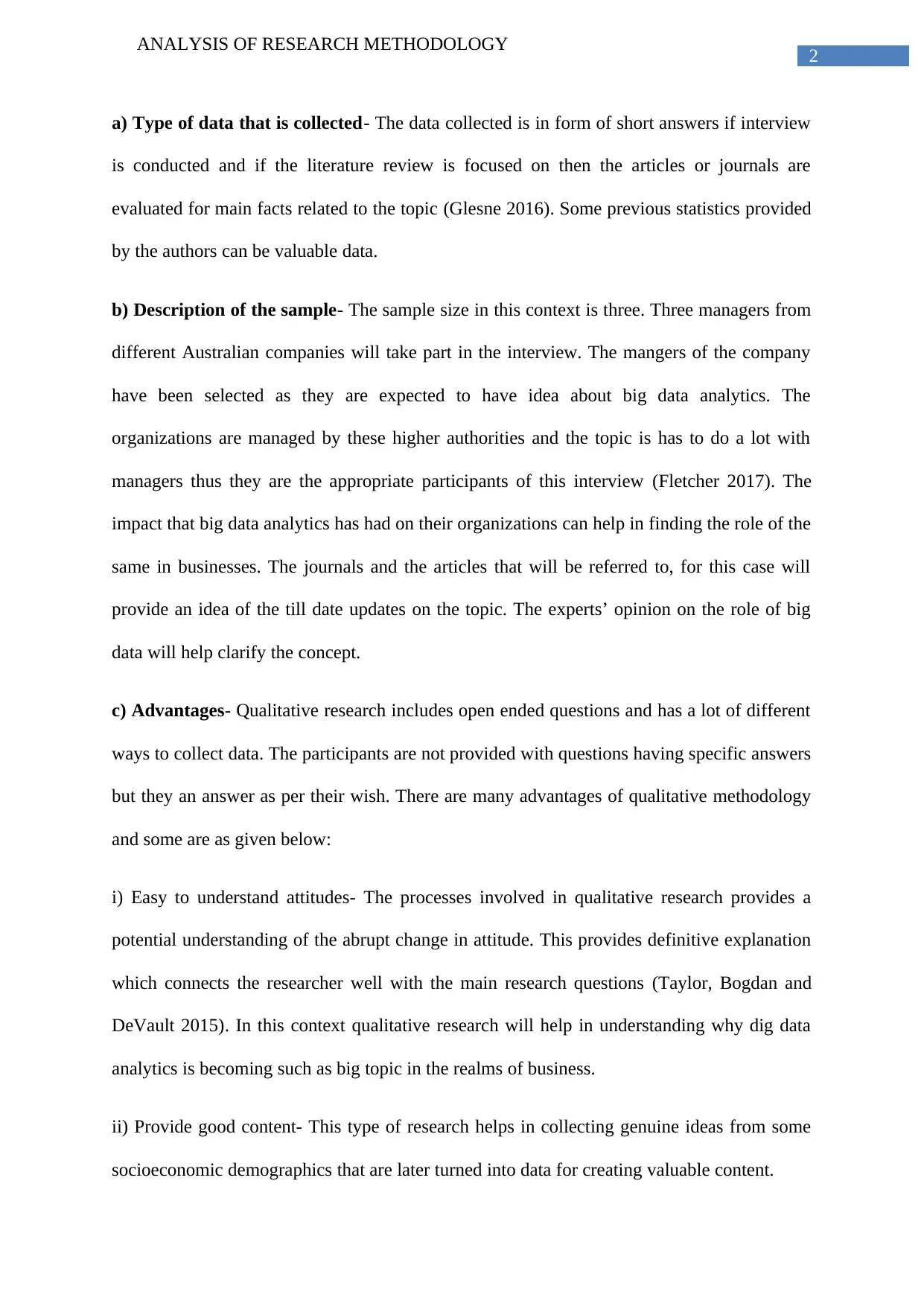
2
ANALYSIS OF RESEARCH METHODOLOGY
a) Type of data that is collected- The data collected is in form of short answers if interview
is conducted and if the literature review is focused on then the articles or journals are
evaluated for main facts related to the topic (Glesne 2016). Some previous statistics provided
by the authors can be valuable data.
b) Description of the sample- The sample size in this context is three. Three managers from
different Australian companies will take part in the interview. The mangers of the company
have been selected as they are expected to have idea about big data analytics. The
organizations are managed by these higher authorities and the topic is has to do a lot with
managers thus they are the appropriate participants of this interview (Fletcher 2017). The
impact that big data analytics has had on their organizations can help in finding the role of the
same in businesses. The journals and the articles that will be referred to, for this case will
provide an idea of the till date updates on the topic. The experts’ opinion on the role of big
data will help clarify the concept.
c) Advantages- Qualitative research includes open ended questions and has a lot of different
ways to collect data. The participants are not provided with questions having specific answers
but they an answer as per their wish. There are many advantages of qualitative methodology
and some are as given below:
i) Easy to understand attitudes- The processes involved in qualitative research provides a
potential understanding of the abrupt change in attitude. This provides definitive explanation
which connects the researcher well with the main research questions (Taylor, Bogdan and
DeVault 2015). In this context qualitative research will help in understanding why dig data
analytics is becoming such as big topic in the realms of business.
ii) Provide good content- This type of research helps in collecting genuine ideas from some
socioeconomic demographics that are later turned into data for creating valuable content.
ANALYSIS OF RESEARCH METHODOLOGY
a) Type of data that is collected- The data collected is in form of short answers if interview
is conducted and if the literature review is focused on then the articles or journals are
evaluated for main facts related to the topic (Glesne 2016). Some previous statistics provided
by the authors can be valuable data.
b) Description of the sample- The sample size in this context is three. Three managers from
different Australian companies will take part in the interview. The mangers of the company
have been selected as they are expected to have idea about big data analytics. The
organizations are managed by these higher authorities and the topic is has to do a lot with
managers thus they are the appropriate participants of this interview (Fletcher 2017). The
impact that big data analytics has had on their organizations can help in finding the role of the
same in businesses. The journals and the articles that will be referred to, for this case will
provide an idea of the till date updates on the topic. The experts’ opinion on the role of big
data will help clarify the concept.
c) Advantages- Qualitative research includes open ended questions and has a lot of different
ways to collect data. The participants are not provided with questions having specific answers
but they an answer as per their wish. There are many advantages of qualitative methodology
and some are as given below:
i) Easy to understand attitudes- The processes involved in qualitative research provides a
potential understanding of the abrupt change in attitude. This provides definitive explanation
which connects the researcher well with the main research questions (Taylor, Bogdan and
DeVault 2015). In this context qualitative research will help in understanding why dig data
analytics is becoming such as big topic in the realms of business.
ii) Provide good content- This type of research helps in collecting genuine ideas from some
socioeconomic demographics that are later turned into data for creating valuable content.
⊘ This is a preview!⊘
Do you want full access?
Subscribe today to unlock all pages.

Trusted by 1+ million students worldwide
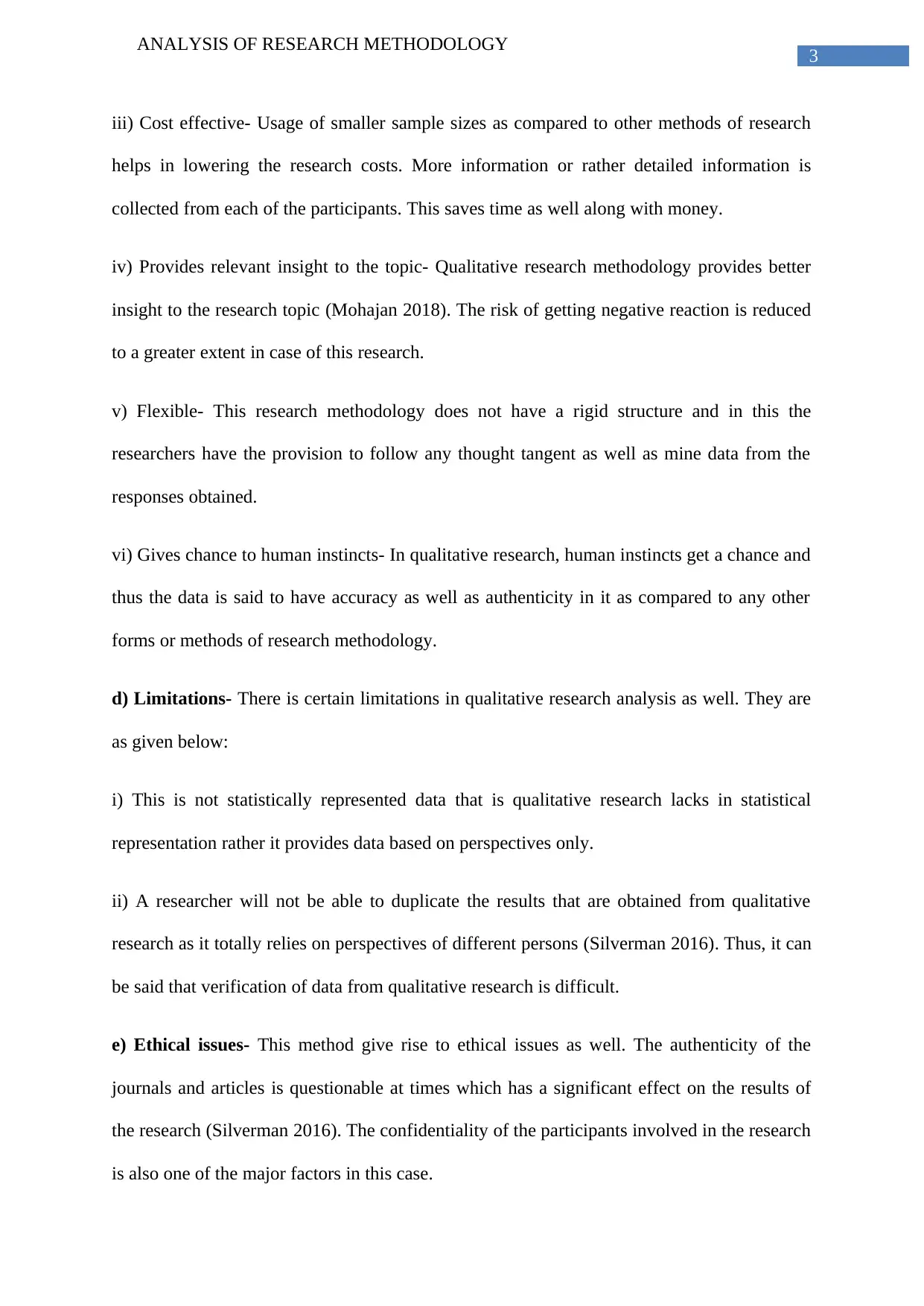
3
ANALYSIS OF RESEARCH METHODOLOGY
iii) Cost effective- Usage of smaller sample sizes as compared to other methods of research
helps in lowering the research costs. More information or rather detailed information is
collected from each of the participants. This saves time as well along with money.
iv) Provides relevant insight to the topic- Qualitative research methodology provides better
insight to the research topic (Mohajan 2018). The risk of getting negative reaction is reduced
to a greater extent in case of this research.
v) Flexible- This research methodology does not have a rigid structure and in this the
researchers have the provision to follow any thought tangent as well as mine data from the
responses obtained.
vi) Gives chance to human instincts- In qualitative research, human instincts get a chance and
thus the data is said to have accuracy as well as authenticity in it as compared to any other
forms or methods of research methodology.
d) Limitations- There is certain limitations in qualitative research analysis as well. They are
as given below:
i) This is not statistically represented data that is qualitative research lacks in statistical
representation rather it provides data based on perspectives only.
ii) A researcher will not be able to duplicate the results that are obtained from qualitative
research as it totally relies on perspectives of different persons (Silverman 2016). Thus, it can
be said that verification of data from qualitative research is difficult.
e) Ethical issues- This method give rise to ethical issues as well. The authenticity of the
journals and articles is questionable at times which has a significant effect on the results of
the research (Silverman 2016). The confidentiality of the participants involved in the research
is also one of the major factors in this case.
ANALYSIS OF RESEARCH METHODOLOGY
iii) Cost effective- Usage of smaller sample sizes as compared to other methods of research
helps in lowering the research costs. More information or rather detailed information is
collected from each of the participants. This saves time as well along with money.
iv) Provides relevant insight to the topic- Qualitative research methodology provides better
insight to the research topic (Mohajan 2018). The risk of getting negative reaction is reduced
to a greater extent in case of this research.
v) Flexible- This research methodology does not have a rigid structure and in this the
researchers have the provision to follow any thought tangent as well as mine data from the
responses obtained.
vi) Gives chance to human instincts- In qualitative research, human instincts get a chance and
thus the data is said to have accuracy as well as authenticity in it as compared to any other
forms or methods of research methodology.
d) Limitations- There is certain limitations in qualitative research analysis as well. They are
as given below:
i) This is not statistically represented data that is qualitative research lacks in statistical
representation rather it provides data based on perspectives only.
ii) A researcher will not be able to duplicate the results that are obtained from qualitative
research as it totally relies on perspectives of different persons (Silverman 2016). Thus, it can
be said that verification of data from qualitative research is difficult.
e) Ethical issues- This method give rise to ethical issues as well. The authenticity of the
journals and articles is questionable at times which has a significant effect on the results of
the research (Silverman 2016). The confidentiality of the participants involved in the research
is also one of the major factors in this case.
Paraphrase This Document
Need a fresh take? Get an instant paraphrase of this document with our AI Paraphraser
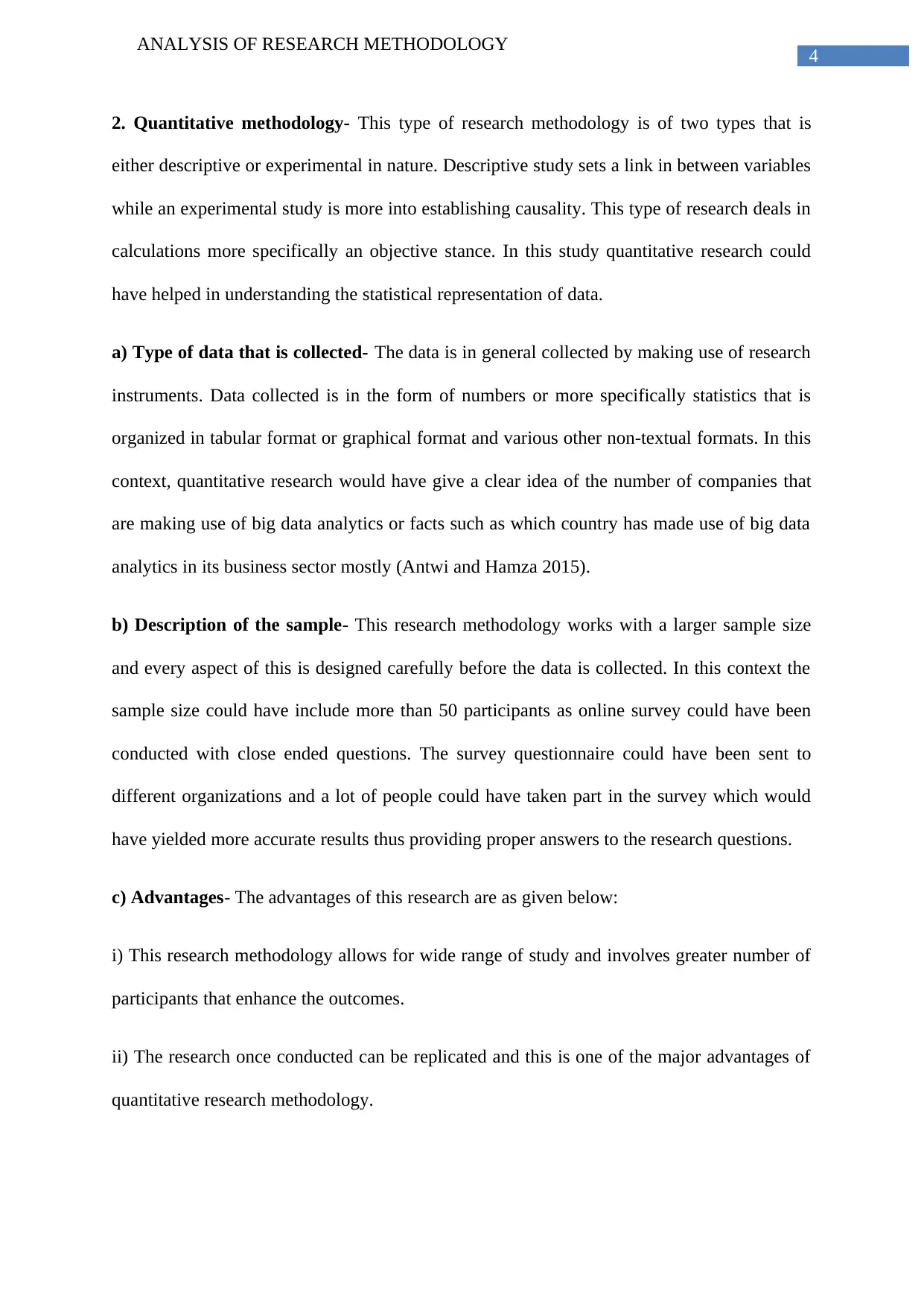
4
ANALYSIS OF RESEARCH METHODOLOGY
2. Quantitative methodology- This type of research methodology is of two types that is
either descriptive or experimental in nature. Descriptive study sets a link in between variables
while an experimental study is more into establishing causality. This type of research deals in
calculations more specifically an objective stance. In this study quantitative research could
have helped in understanding the statistical representation of data.
a) Type of data that is collected- The data is in general collected by making use of research
instruments. Data collected is in the form of numbers or more specifically statistics that is
organized in tabular format or graphical format and various other non-textual formats. In this
context, quantitative research would have give a clear idea of the number of companies that
are making use of big data analytics or facts such as which country has made use of big data
analytics in its business sector mostly (Antwi and Hamza 2015).
b) Description of the sample- This research methodology works with a larger sample size
and every aspect of this is designed carefully before the data is collected. In this context the
sample size could have include more than 50 participants as online survey could have been
conducted with close ended questions. The survey questionnaire could have been sent to
different organizations and a lot of people could have taken part in the survey which would
have yielded more accurate results thus providing proper answers to the research questions.
c) Advantages- The advantages of this research are as given below:
i) This research methodology allows for wide range of study and involves greater number of
participants that enhance the outcomes.
ii) The research once conducted can be replicated and this is one of the major advantages of
quantitative research methodology.
ANALYSIS OF RESEARCH METHODOLOGY
2. Quantitative methodology- This type of research methodology is of two types that is
either descriptive or experimental in nature. Descriptive study sets a link in between variables
while an experimental study is more into establishing causality. This type of research deals in
calculations more specifically an objective stance. In this study quantitative research could
have helped in understanding the statistical representation of data.
a) Type of data that is collected- The data is in general collected by making use of research
instruments. Data collected is in the form of numbers or more specifically statistics that is
organized in tabular format or graphical format and various other non-textual formats. In this
context, quantitative research would have give a clear idea of the number of companies that
are making use of big data analytics or facts such as which country has made use of big data
analytics in its business sector mostly (Antwi and Hamza 2015).
b) Description of the sample- This research methodology works with a larger sample size
and every aspect of this is designed carefully before the data is collected. In this context the
sample size could have include more than 50 participants as online survey could have been
conducted with close ended questions. The survey questionnaire could have been sent to
different organizations and a lot of people could have taken part in the survey which would
have yielded more accurate results thus providing proper answers to the research questions.
c) Advantages- The advantages of this research are as given below:
i) This research methodology allows for wide range of study and involves greater number of
participants that enhance the outcomes.
ii) The research once conducted can be replicated and this is one of the major advantages of
quantitative research methodology.
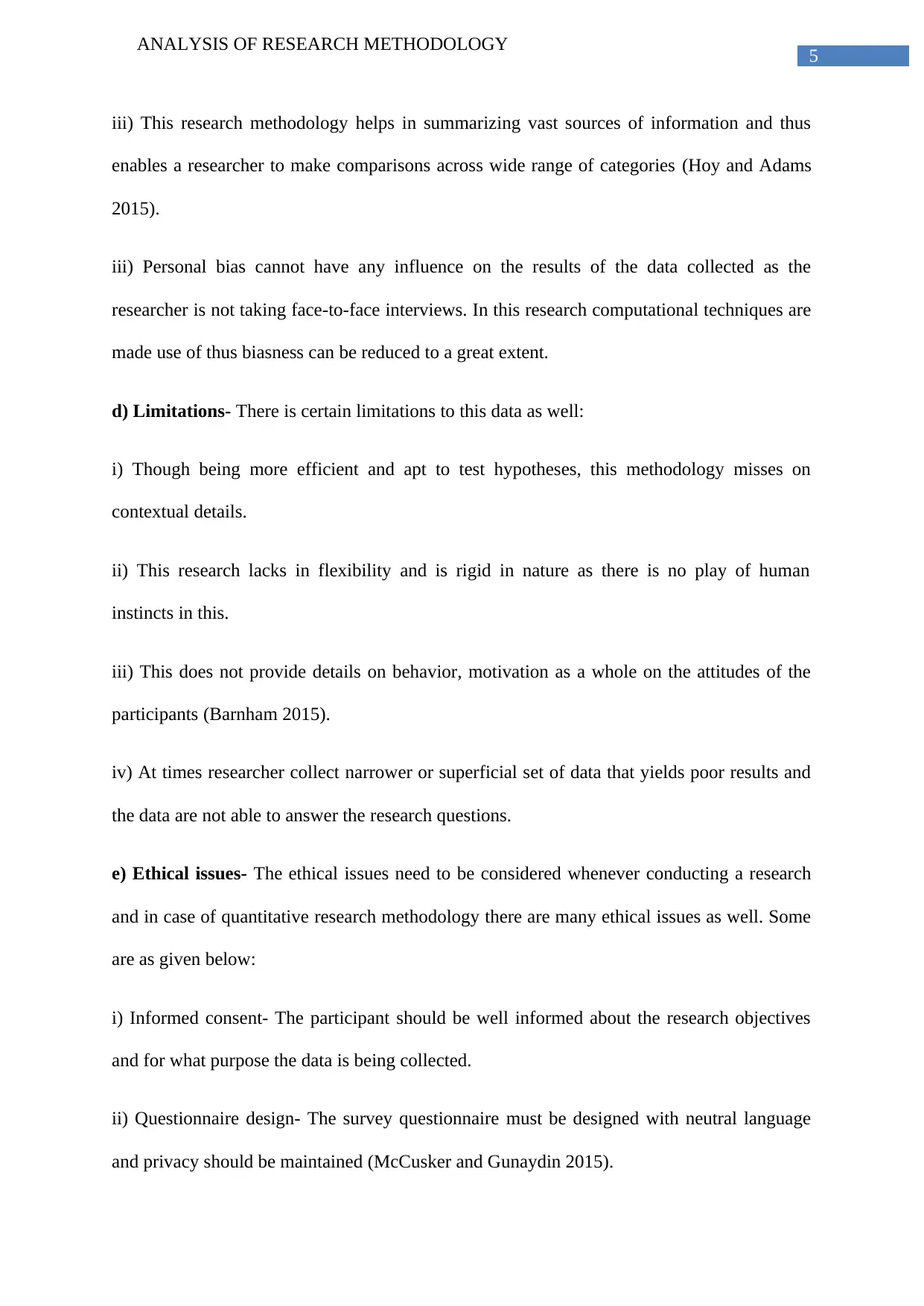
5
ANALYSIS OF RESEARCH METHODOLOGY
iii) This research methodology helps in summarizing vast sources of information and thus
enables a researcher to make comparisons across wide range of categories (Hoy and Adams
2015).
iii) Personal bias cannot have any influence on the results of the data collected as the
researcher is not taking face-to-face interviews. In this research computational techniques are
made use of thus biasness can be reduced to a great extent.
d) Limitations- There is certain limitations to this data as well:
i) Though being more efficient and apt to test hypotheses, this methodology misses on
contextual details.
ii) This research lacks in flexibility and is rigid in nature as there is no play of human
instincts in this.
iii) This does not provide details on behavior, motivation as a whole on the attitudes of the
participants (Barnham 2015).
iv) At times researcher collect narrower or superficial set of data that yields poor results and
the data are not able to answer the research questions.
e) Ethical issues- The ethical issues need to be considered whenever conducting a research
and in case of quantitative research methodology there are many ethical issues as well. Some
are as given below:
i) Informed consent- The participant should be well informed about the research objectives
and for what purpose the data is being collected.
ii) Questionnaire design- The survey questionnaire must be designed with neutral language
and privacy should be maintained (McCusker and Gunaydin 2015).
ANALYSIS OF RESEARCH METHODOLOGY
iii) This research methodology helps in summarizing vast sources of information and thus
enables a researcher to make comparisons across wide range of categories (Hoy and Adams
2015).
iii) Personal bias cannot have any influence on the results of the data collected as the
researcher is not taking face-to-face interviews. In this research computational techniques are
made use of thus biasness can be reduced to a great extent.
d) Limitations- There is certain limitations to this data as well:
i) Though being more efficient and apt to test hypotheses, this methodology misses on
contextual details.
ii) This research lacks in flexibility and is rigid in nature as there is no play of human
instincts in this.
iii) This does not provide details on behavior, motivation as a whole on the attitudes of the
participants (Barnham 2015).
iv) At times researcher collect narrower or superficial set of data that yields poor results and
the data are not able to answer the research questions.
e) Ethical issues- The ethical issues need to be considered whenever conducting a research
and in case of quantitative research methodology there are many ethical issues as well. Some
are as given below:
i) Informed consent- The participant should be well informed about the research objectives
and for what purpose the data is being collected.
ii) Questionnaire design- The survey questionnaire must be designed with neutral language
and privacy should be maintained (McCusker and Gunaydin 2015).
⊘ This is a preview!⊘
Do you want full access?
Subscribe today to unlock all pages.

Trusted by 1+ million students worldwide
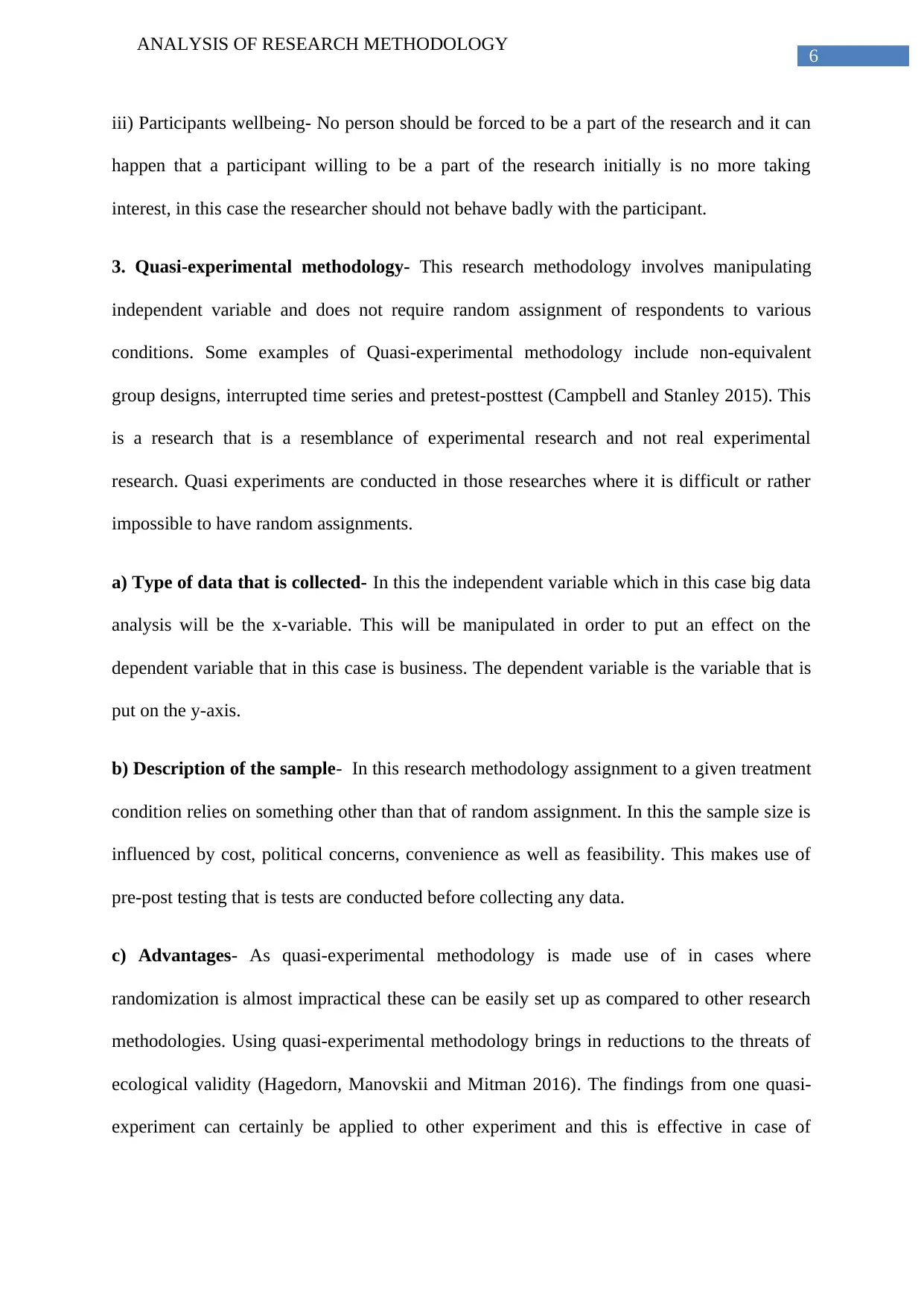
6
ANALYSIS OF RESEARCH METHODOLOGY
iii) Participants wellbeing- No person should be forced to be a part of the research and it can
happen that a participant willing to be a part of the research initially is no more taking
interest, in this case the researcher should not behave badly with the participant.
3. Quasi-experimental methodology- This research methodology involves manipulating
independent variable and does not require random assignment of respondents to various
conditions. Some examples of Quasi-experimental methodology include non-equivalent
group designs, interrupted time series and pretest-posttest (Campbell and Stanley 2015). This
is a research that is a resemblance of experimental research and not real experimental
research. Quasi experiments are conducted in those researches where it is difficult or rather
impossible to have random assignments.
a) Type of data that is collected- In this the independent variable which in this case big data
analysis will be the x-variable. This will be manipulated in order to put an effect on the
dependent variable that in this case is business. The dependent variable is the variable that is
put on the y-axis.
b) Description of the sample- In this research methodology assignment to a given treatment
condition relies on something other than that of random assignment. In this the sample size is
influenced by cost, political concerns, convenience as well as feasibility. This makes use of
pre-post testing that is tests are conducted before collecting any data.
c) Advantages- As quasi-experimental methodology is made use of in cases where
randomization is almost impractical these can be easily set up as compared to other research
methodologies. Using quasi-experimental methodology brings in reductions to the threats of
ecological validity (Hagedorn, Manovskii and Mitman 2016). The findings from one quasi-
experiment can certainly be applied to other experiment and this is effective in case of
ANALYSIS OF RESEARCH METHODOLOGY
iii) Participants wellbeing- No person should be forced to be a part of the research and it can
happen that a participant willing to be a part of the research initially is no more taking
interest, in this case the researcher should not behave badly with the participant.
3. Quasi-experimental methodology- This research methodology involves manipulating
independent variable and does not require random assignment of respondents to various
conditions. Some examples of Quasi-experimental methodology include non-equivalent
group designs, interrupted time series and pretest-posttest (Campbell and Stanley 2015). This
is a research that is a resemblance of experimental research and not real experimental
research. Quasi experiments are conducted in those researches where it is difficult or rather
impossible to have random assignments.
a) Type of data that is collected- In this the independent variable which in this case big data
analysis will be the x-variable. This will be manipulated in order to put an effect on the
dependent variable that in this case is business. The dependent variable is the variable that is
put on the y-axis.
b) Description of the sample- In this research methodology assignment to a given treatment
condition relies on something other than that of random assignment. In this the sample size is
influenced by cost, political concerns, convenience as well as feasibility. This makes use of
pre-post testing that is tests are conducted before collecting any data.
c) Advantages- As quasi-experimental methodology is made use of in cases where
randomization is almost impractical these can be easily set up as compared to other research
methodologies. Using quasi-experimental methodology brings in reductions to the threats of
ecological validity (Hagedorn, Manovskii and Mitman 2016). The findings from one quasi-
experiment can certainly be applied to other experiment and this is effective in case of
Paraphrase This Document
Need a fresh take? Get an instant paraphrase of this document with our AI Paraphraser
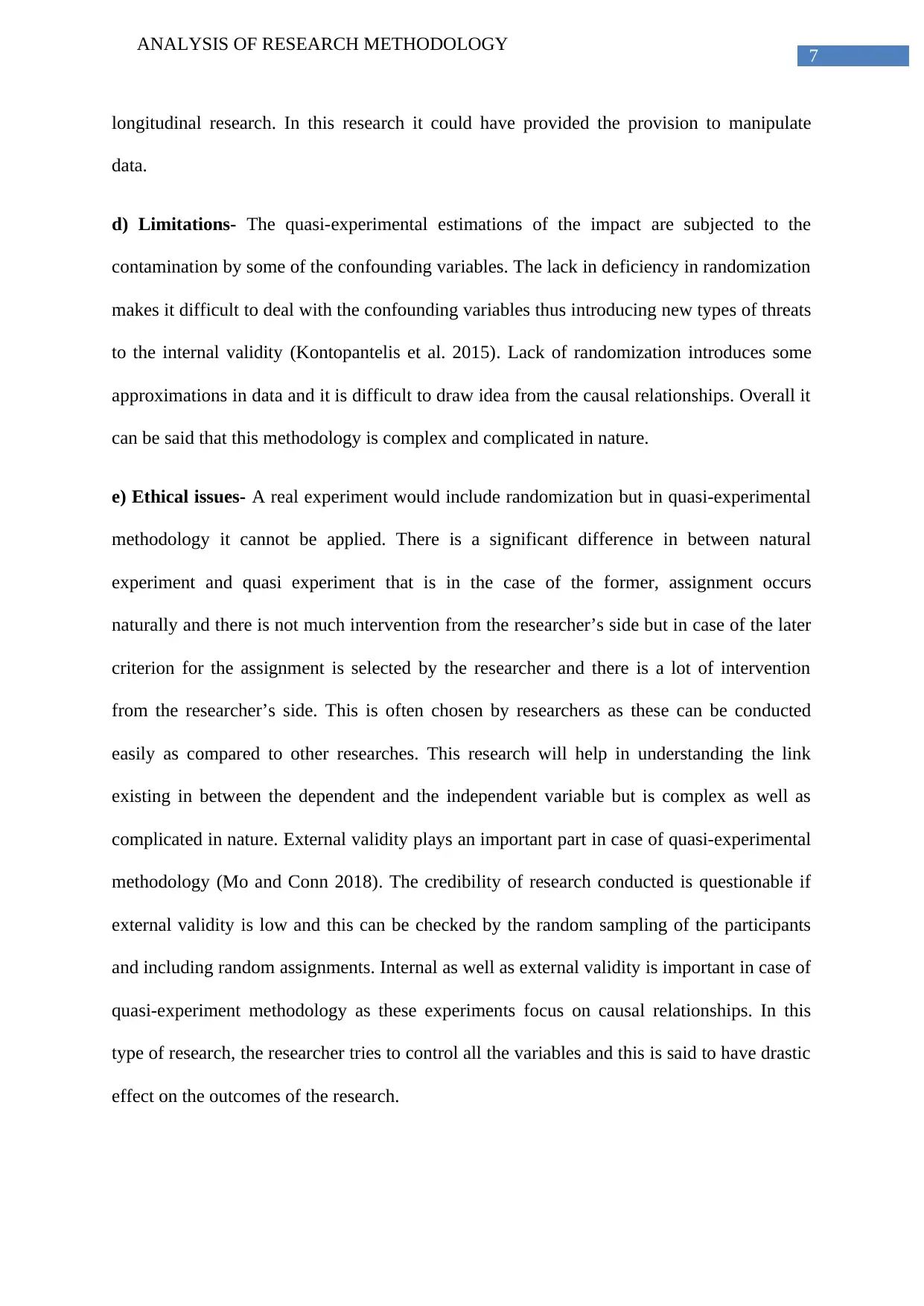
7
ANALYSIS OF RESEARCH METHODOLOGY
longitudinal research. In this research it could have provided the provision to manipulate
data.
d) Limitations- The quasi-experimental estimations of the impact are subjected to the
contamination by some of the confounding variables. The lack in deficiency in randomization
makes it difficult to deal with the confounding variables thus introducing new types of threats
to the internal validity (Kontopantelis et al. 2015). Lack of randomization introduces some
approximations in data and it is difficult to draw idea from the causal relationships. Overall it
can be said that this methodology is complex and complicated in nature.
e) Ethical issues- A real experiment would include randomization but in quasi-experimental
methodology it cannot be applied. There is a significant difference in between natural
experiment and quasi experiment that is in the case of the former, assignment occurs
naturally and there is not much intervention from the researcher’s side but in case of the later
criterion for the assignment is selected by the researcher and there is a lot of intervention
from the researcher’s side. This is often chosen by researchers as these can be conducted
easily as compared to other researches. This research will help in understanding the link
existing in between the dependent and the independent variable but is complex as well as
complicated in nature. External validity plays an important part in case of quasi-experimental
methodology (Mo and Conn 2018). The credibility of research conducted is questionable if
external validity is low and this can be checked by the random sampling of the participants
and including random assignments. Internal as well as external validity is important in case of
quasi-experiment methodology as these experiments focus on causal relationships. In this
type of research, the researcher tries to control all the variables and this is said to have drastic
effect on the outcomes of the research.
ANALYSIS OF RESEARCH METHODOLOGY
longitudinal research. In this research it could have provided the provision to manipulate
data.
d) Limitations- The quasi-experimental estimations of the impact are subjected to the
contamination by some of the confounding variables. The lack in deficiency in randomization
makes it difficult to deal with the confounding variables thus introducing new types of threats
to the internal validity (Kontopantelis et al. 2015). Lack of randomization introduces some
approximations in data and it is difficult to draw idea from the causal relationships. Overall it
can be said that this methodology is complex and complicated in nature.
e) Ethical issues- A real experiment would include randomization but in quasi-experimental
methodology it cannot be applied. There is a significant difference in between natural
experiment and quasi experiment that is in the case of the former, assignment occurs
naturally and there is not much intervention from the researcher’s side but in case of the later
criterion for the assignment is selected by the researcher and there is a lot of intervention
from the researcher’s side. This is often chosen by researchers as these can be conducted
easily as compared to other researches. This research will help in understanding the link
existing in between the dependent and the independent variable but is complex as well as
complicated in nature. External validity plays an important part in case of quasi-experimental
methodology (Mo and Conn 2018). The credibility of research conducted is questionable if
external validity is low and this can be checked by the random sampling of the participants
and including random assignments. Internal as well as external validity is important in case of
quasi-experiment methodology as these experiments focus on causal relationships. In this
type of research, the researcher tries to control all the variables and this is said to have drastic
effect on the outcomes of the research.
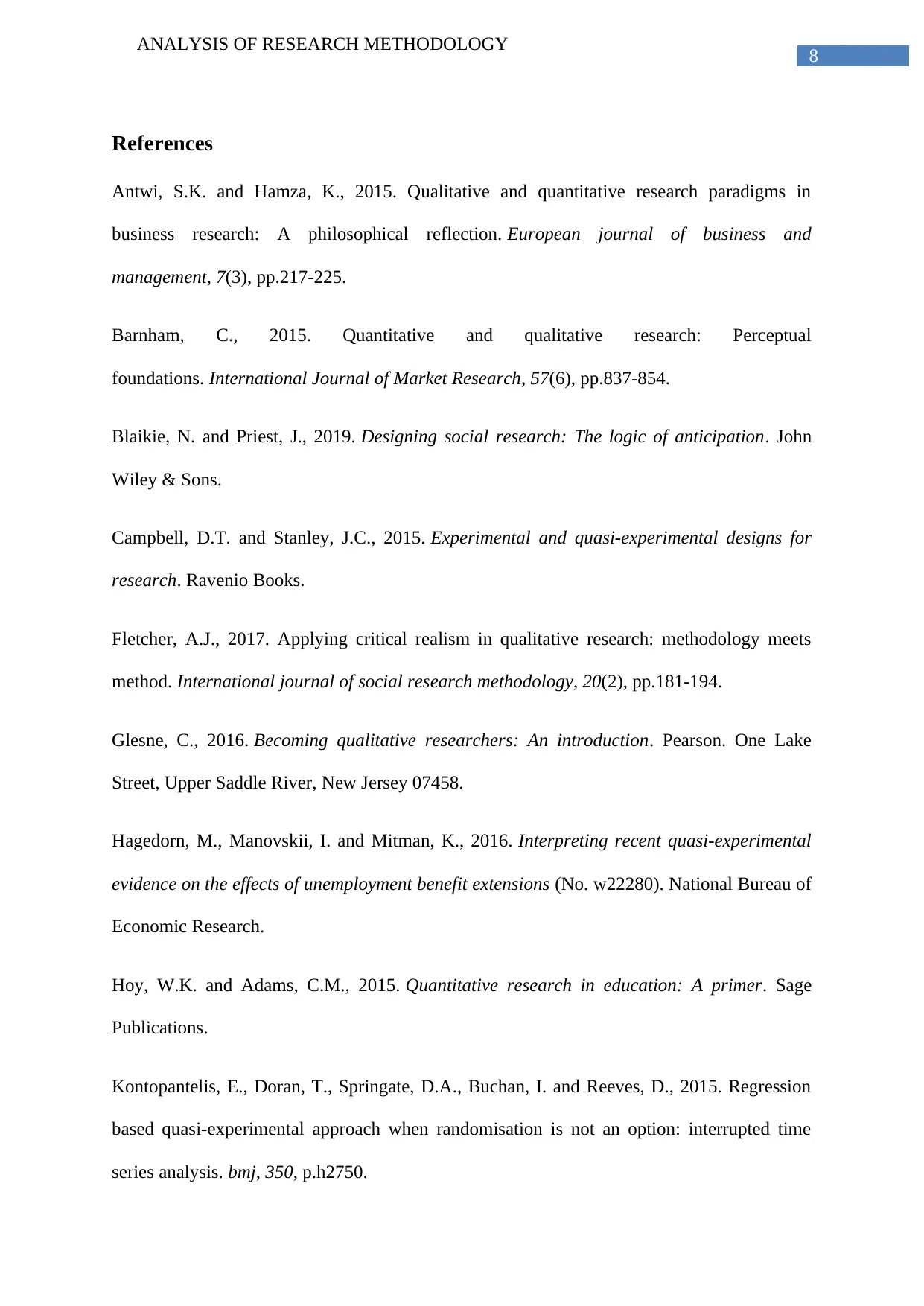
8
ANALYSIS OF RESEARCH METHODOLOGY
References
Antwi, S.K. and Hamza, K., 2015. Qualitative and quantitative research paradigms in
business research: A philosophical reflection. European journal of business and
management, 7(3), pp.217-225.
Barnham, C., 2015. Quantitative and qualitative research: Perceptual
foundations. International Journal of Market Research, 57(6), pp.837-854.
Blaikie, N. and Priest, J., 2019. Designing social research: The logic of anticipation. John
Wiley & Sons.
Campbell, D.T. and Stanley, J.C., 2015. Experimental and quasi-experimental designs for
research. Ravenio Books.
Fletcher, A.J., 2017. Applying critical realism in qualitative research: methodology meets
method. International journal of social research methodology, 20(2), pp.181-194.
Glesne, C., 2016. Becoming qualitative researchers: An introduction. Pearson. One Lake
Street, Upper Saddle River, New Jersey 07458.
Hagedorn, M., Manovskii, I. and Mitman, K., 2016. Interpreting recent quasi-experimental
evidence on the effects of unemployment benefit extensions (No. w22280). National Bureau of
Economic Research.
Hoy, W.K. and Adams, C.M., 2015. Quantitative research in education: A primer. Sage
Publications.
Kontopantelis, E., Doran, T., Springate, D.A., Buchan, I. and Reeves, D., 2015. Regression
based quasi-experimental approach when randomisation is not an option: interrupted time
series analysis. bmj, 350, p.h2750.
ANALYSIS OF RESEARCH METHODOLOGY
References
Antwi, S.K. and Hamza, K., 2015. Qualitative and quantitative research paradigms in
business research: A philosophical reflection. European journal of business and
management, 7(3), pp.217-225.
Barnham, C., 2015. Quantitative and qualitative research: Perceptual
foundations. International Journal of Market Research, 57(6), pp.837-854.
Blaikie, N. and Priest, J., 2019. Designing social research: The logic of anticipation. John
Wiley & Sons.
Campbell, D.T. and Stanley, J.C., 2015. Experimental and quasi-experimental designs for
research. Ravenio Books.
Fletcher, A.J., 2017. Applying critical realism in qualitative research: methodology meets
method. International journal of social research methodology, 20(2), pp.181-194.
Glesne, C., 2016. Becoming qualitative researchers: An introduction. Pearson. One Lake
Street, Upper Saddle River, New Jersey 07458.
Hagedorn, M., Manovskii, I. and Mitman, K., 2016. Interpreting recent quasi-experimental
evidence on the effects of unemployment benefit extensions (No. w22280). National Bureau of
Economic Research.
Hoy, W.K. and Adams, C.M., 2015. Quantitative research in education: A primer. Sage
Publications.
Kontopantelis, E., Doran, T., Springate, D.A., Buchan, I. and Reeves, D., 2015. Regression
based quasi-experimental approach when randomisation is not an option: interrupted time
series analysis. bmj, 350, p.h2750.
⊘ This is a preview!⊘
Do you want full access?
Subscribe today to unlock all pages.

Trusted by 1+ million students worldwide
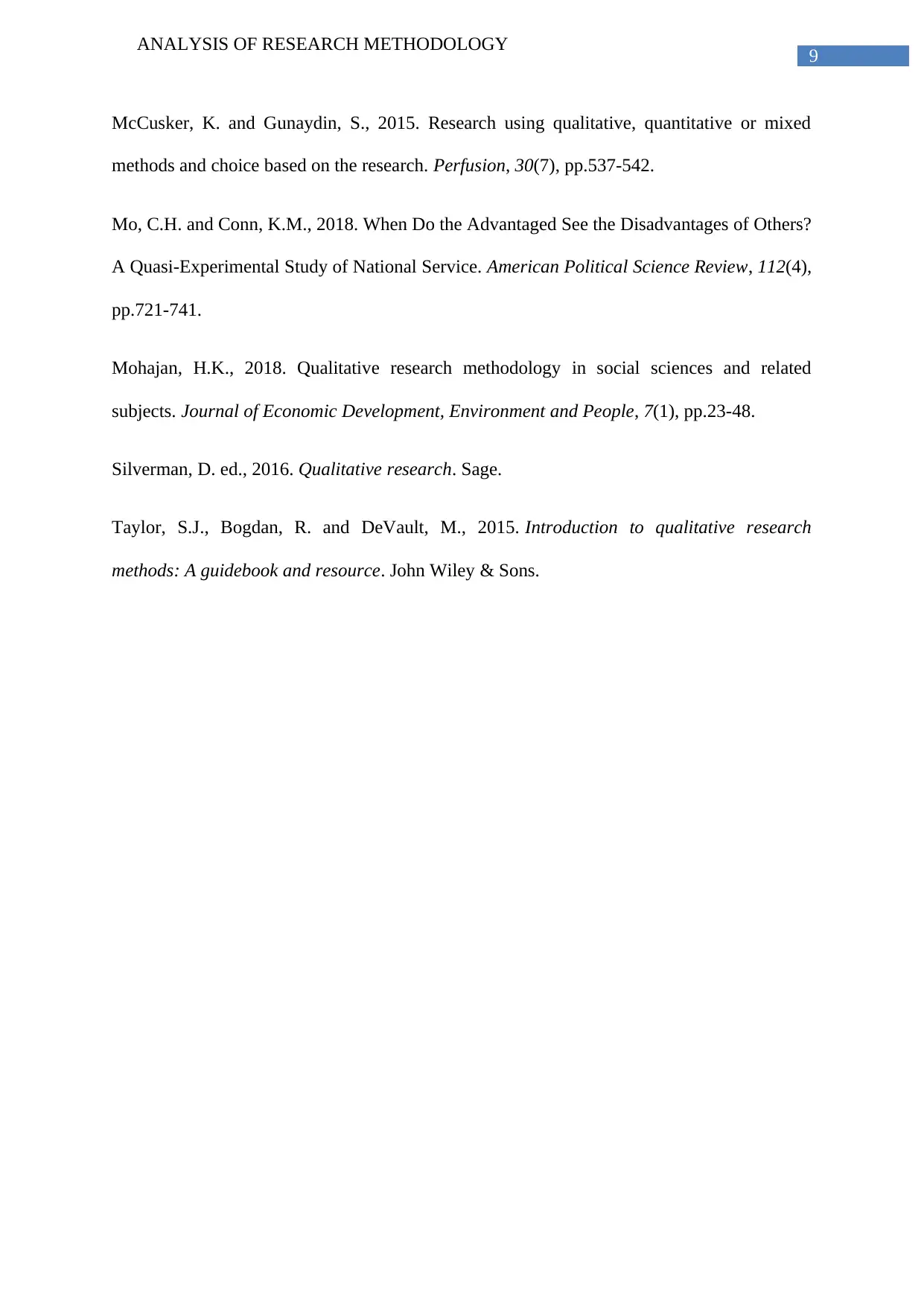
9
ANALYSIS OF RESEARCH METHODOLOGY
McCusker, K. and Gunaydin, S., 2015. Research using qualitative, quantitative or mixed
methods and choice based on the research. Perfusion, 30(7), pp.537-542.
Mo, C.H. and Conn, K.M., 2018. When Do the Advantaged See the Disadvantages of Others?
A Quasi-Experimental Study of National Service. American Political Science Review, 112(4),
pp.721-741.
Mohajan, H.K., 2018. Qualitative research methodology in social sciences and related
subjects. Journal of Economic Development, Environment and People, 7(1), pp.23-48.
Silverman, D. ed., 2016. Qualitative research. Sage.
Taylor, S.J., Bogdan, R. and DeVault, M., 2015. Introduction to qualitative research
methods: A guidebook and resource. John Wiley & Sons.
ANALYSIS OF RESEARCH METHODOLOGY
McCusker, K. and Gunaydin, S., 2015. Research using qualitative, quantitative or mixed
methods and choice based on the research. Perfusion, 30(7), pp.537-542.
Mo, C.H. and Conn, K.M., 2018. When Do the Advantaged See the Disadvantages of Others?
A Quasi-Experimental Study of National Service. American Political Science Review, 112(4),
pp.721-741.
Mohajan, H.K., 2018. Qualitative research methodology in social sciences and related
subjects. Journal of Economic Development, Environment and People, 7(1), pp.23-48.
Silverman, D. ed., 2016. Qualitative research. Sage.
Taylor, S.J., Bogdan, R. and DeVault, M., 2015. Introduction to qualitative research
methods: A guidebook and resource. John Wiley & Sons.
1 out of 10
Related Documents
Your All-in-One AI-Powered Toolkit for Academic Success.
+13062052269
info@desklib.com
Available 24*7 on WhatsApp / Email
![[object Object]](/_next/static/media/star-bottom.7253800d.svg)
Unlock your academic potential
Copyright © 2020–2026 A2Z Services. All Rights Reserved. Developed and managed by ZUCOL.




